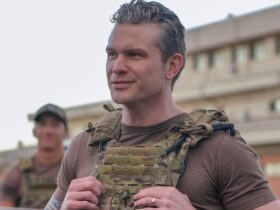The risk of a great war has become real again. That changes everything. Personal conversations, even into the dreams, sneak up fears. But does Germany really already know what the hour did?
When I was a editor -in -chief of “Cicero”, we had a colleague with a literally priceless property: an unmistakable feeling. To do this, you first have to know that with a magazine the cover, i.e. the combination of the cover and line, decides on the well -being and woe of the output. They are these few tenths of a second, in which the mixture either ignites and encouraged to buy at the kiosk – or just fizzled out. So we presented the two to three designs to the colleague in question and asked him for his choice. Which should we take? If he pointed to one or two of the designs full of conviction and with a death -confident instinct, we knew exactly: they are not exactly. Practice had painfully provided the evidence when we had occasionally taken his suggestions from time to time.
For years I have been doing something similar with regular reliability with the political essays of Jürgen Habermas. If the aged man interferes with the political event, I know exactly that in almost all cases I am in good hands with the opposite of what one of the few remaining large intellectuals of this country had just postulated here.
Now that happened again in the attentive reading of his current essay “for Europe” in the “Süddeutsche Zeitung” from weekend. I am so grateful to him that this should now be taken without any assumed irony, infinitely grateful for the fact that as a leading figure of left -wing liberalism, he has made it clear to his supporters with all sympathetic urge to pacifism, which is why Europe must now quickly equip itself for the dark time that has been broken.

Christoph Schwennicke is head of the T-Online. He has been accompanied, observed and analyzed the political events in Berlin for almost 30 years, previously in Bonn. For the “Süddeutsche Zeitung”, the “Spiegel” and the political magazine “Cicero”, whose editor -in -chief and publisher he was over for many years. At T-Online, his column “Objection!” Appears every Thursday.
But man is wrong as long as he writes. Even a Jürgen Habermas. At the end of his essay, he notes that in this “upgrade wave” some overzealous people mistakenly wanted to put on the steel helmet again with the conscription. In the middle of states that almost all of them would have abolished conscription “, from the insight, one is” in the middle of the insight “that this murderous form of violence is inhumane”.
Apart from the fact that the first countries like Sweden have already reintroduced them: It is so touchingly simple and briefly thought that one might think that this statement came from the Loisl or the Mariandl, somewhere from the back of Vorarlberg and not from one of the largest living German thinkers. Unfortunately, it is the case that we are actually in the middle of states that made this error in the times of the great supposed peace dividend. But now all of these countries and us face a Vladimir Putin in Russia, which has made this murderous form of violence, vulgo: war, terribly the first means of his politics.
That has just changed. Everything. The conversations among friends and acquaintances. Yes, even the dreams. I recently slept in height for a few nights, and I always dreamed a lot. This time I saw in a dream how a volley fell into a village on a opposite hill, she went down from a rain cloud over the village like a curtain. We fled into a kind of garage and tried to extinguish the burning stuff, which was poured in by the garage’s openings. In addition, I have had two intensive conversations with mothers of sons of military age in the past few days. They both talked about how they could not bear their sons in war and what they would set in motion so that their sons would not be drafted in the event of war.
The “Stern” (its reigning editor -in -chief shows a very good feeling for cover and lines) has dedicated his current edition to this topic. “Would you fight for Germany?” Asks the line and shows the image mounting of a curly young man with an innocent look and half a helmet on the head. In the Tagesschau, pictures of homeland protection brigades from grayed older gentlemen run into the uniform again.






